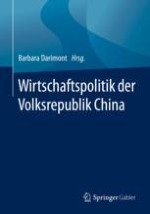2020 | OriginalPaper | Buchkapitel
5. Wirtschaftspolitische Ziele und Diskurse
verfasst von : Johannes Lamade
Erschienen in: Wirtschaftspolitik der Volksrepublik China
Verlag: Springer Fachmedien Wiesbaden
Aktivieren Sie unsere intelligente Suche, um passende Fachinhalte oder Patente zu finden.
Wählen Sie Textabschnitte aus um mit Künstlicher Intelligenz passenden Patente zu finden. powered by
Markieren Sie Textabschnitte, um KI-gestützt weitere passende Inhalte zu finden. powered by
